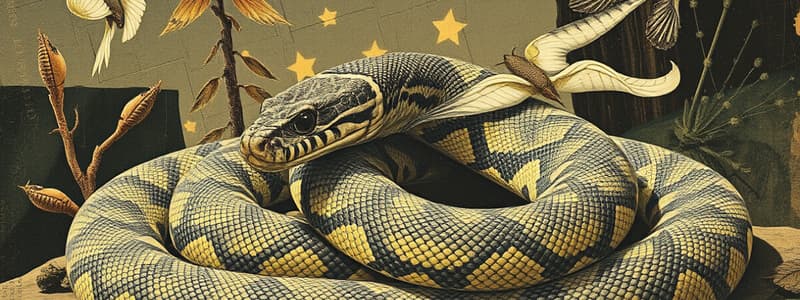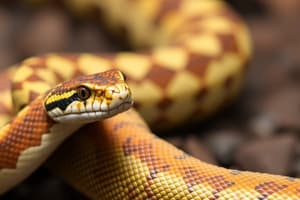Podcast
Questions and Answers
What is the maximum length that Burmese pythons are known to regularly reach?
What is the maximum length that Burmese pythons are known to regularly reach?
- 10 feet
- 15 feet
- 25 feet
- 20 feet (correct)
What was a possible reason for the introduction of Floridian pythons into the wild?
What was a possible reason for the introduction of Floridian pythons into the wild?
- Illegal hunting in the area
- Intentional release as part of a conservation effort
- Escaped from homes during a hurricane (correct)
- Escapes during a breeding program
How much could Titanoboa weigh, according to scientific beliefs?
How much could Titanoboa weigh, according to scientific beliefs?
- Up to 400 pounds
- Between 600 to 800 pounds
- Around 500 pounds
- Over a ton (correct)
In which habitat is it believed that Titanoboa lived?
In which habitat is it believed that Titanoboa lived?
What does the term 'constrict' generally refer to in relation to snakes?
What does the term 'constrict' generally refer to in relation to snakes?
What is the primary habitat of the green anaconda?
What is the primary habitat of the green anaconda?
What method do green anacondas use to subdue their prey?
What method do green anacondas use to subdue their prey?
How do Burmese pythons adapt their hunting behaviors as they age?
How do Burmese pythons adapt their hunting behaviors as they age?
What is a notable physical characteristic of green anacondas that aids in their hunting?
What is a notable physical characteristic of green anacondas that aids in their hunting?
Where are Burmese pythons considered an invasive species?
Where are Burmese pythons considered an invasive species?
Flashcards are hidden until you start studying
Study Notes
Scaly Beasts: Information on Snakes
- Snakes often portrayed as villains in various media, contributing to fear among many people.
Green Anaconda
- Largest snake species, capable of reaching lengths up to 30 feet and weighing up to 500 pounds.
- While longer species exist, the green anaconda is significantly thicker and heavier.
- Habitat predominantly in the swamps and marshes of the Amazon rainforest.
- Notably slower on land but can outswim most other species in water.
- Hunting method involves lying in wait; eyes and nostrils positioned on top of the head for stealth.
- Non-venomous; kills prey by constriction, tightening grip with each exhalation until suffocation occurs.
- Capable of hunting large animals, including deer and jaguars.
Burmese Python
- Prefers aquatic environments but spends early life in trees, hunting birds and small mammals before migrating to ground level.
- Native to southern and southeast Asia but has become an invasive species in Florida due to escaped pets and breeding facilities.
- Typically reaches nearly 20 feet in length and can weigh up to 200 pounds.
Titanoboa
- Extinct species that existed around the time dinosaurs vanished.
- Estimated lengths of up to 50 feet and weighing over a ton.
- Capable of consuming animals a quarter of its length, potentially eating prey up to 4 meters long.
- Believed to have inhabited tropical swamps in present-day South America, coexisting with large tortoises and crocodiles.
Vocabulary
- "Villain": Refers to the "bad guy" in a film or story.
- "Behemoth": Describes a huge or monstrous creature.
- "Colossal": Indicates a perception of immense weight and size for the anaconda.
- "Mesmerising": Refers to something that captivates or holds attention.
- "Constrict": To tighten or squeeze, particularly in relation to how snakes kill prey.
Vipers Questions Summary
- An anaconda kills its prey by constricting it until suffocation occurs.
- The reticulated python is recognized as the longest snake in the world.
- Burmese pythons begin life in trees and transition to ground and water habitats as they mature.
- The anaconda's head design allows it to hunt effectively by remaining submerged until prey approaches.
- Exact figures for Titanoboa are hard to determine due to its extinction and limited fossil evidence.
Studying That Suits You
Use AI to generate personalized quizzes and flashcards to suit your learning preferences.




